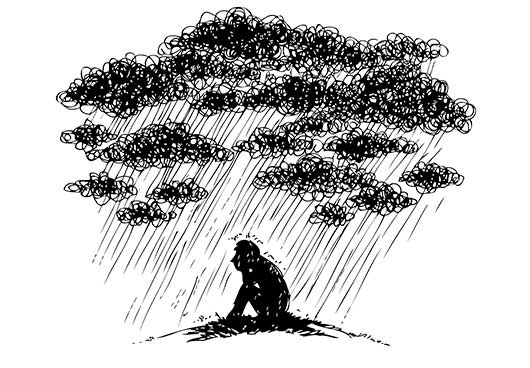7 Things Everyone Should Understand About Depression
January 15th, 2015 ¦ Marsha Jacobson -

When we hear that someone we know has cancer, we will often ask: Did she smoke? Is there a history of cancer in her family? The more reasons we can find to explain away someone’s suffering, the safer it makes us feel. We look for evidence to support why that awful thing couldn’t happen to us. Depression cannot be rationalized as neatly. It is a disease of emotion and because we are all emotional beings, it is more difficult to find reasons why someone else has it and not us. Instead we see depression as a choice because that means we can choose to not have it. I have been told: “snap out of it,”“think positively,”“how can you be depressed when you have so much?”…I am fortunate. I have more than any person could hope for. I have an abundance of people who love me and who I love, but I suffer from depression, not ingratitude.
This disease is widely misunderstood and those who suffer from it perpetuate popular beliefs by hiding in shame, which makes it a “double whammy” disease, as we must then battle the illness as well as it’s stigma. However, this is not the only reason to remove the silence of depression. Effective treatment depends on feeling okay to share our suffering. The incidence of suicide, the result of severe depression could be decreased radically if those suffering sought treatment as they would for any other disease, unencumbered by faulty perspectives and personal shame.
We often fear what we don’t understand. For many years I feared my own depression. I had no clear reasons why I had it, no simple solutions for treating it and no idea where it would take me. But after having lived with bouts of depression for more than forty years, I believe I can educate those who fear or minimize it and help lesson the shame of those who suffer with it:
- DEPRESSION IS A DISEASE – it is not an infection. It cannot be caught. But it is a disease, a chemical malfunction in our brains. We readily accept and understand that many different chemicals, both legal or not, can have a huge impact on our emotional state but believing that our bodies can produce chemicals that do the same, does not have as widespread acceptance. Where is the logic in this?
- DEPRESSION IS NOT SIMPLY FEELING VERY SAD – depression is a faulty perspective of reality. A sad person who is not depressed can think rationally about solutions. A depressed person is unable to do this. A severely pessimistic perspective of life defines depression. In the midst of an episode we are unable to see our world in any other way. Depression does not depend on our experiences. I have seen people suffer terrible life events and not get depressed, while those with charmed lives have.
- DEPRESSION IS NOT A CHOICE – at thirteen my world turned upside down. I went from a positive little girl who loved life to a haunted teenager who suddenly couldn’t understand how happiness was an option for anyone. I couldn’t eat, as frequent bouts of anxiety descended on me like waves of heavy clouds. While that episode of depression lifted, I lost my blissful innocence and never found it again. Why would I choose this? Why would anyone?
- IT IS A SELFISH DISEASE – but we are not necessarily selfish people. Just as diabetes doesn’t pick certain personality types neither does depression. It attacks equally and without discrimination the kind and the unkind, the selfless and the selfish. Depression, however, creates self-absorption. This is a symptom of the disease beyond our control, regardless of how kind we may be during times of remission. When we are in the midst of an episode of depression we are incapable of seeing outwardly. If we were able to do that we wouldn’t be depressed.
- OF COURSE IT’S ALL IN OUR MINDS – that’s where depression resides. “It’s all in your head” is thrown around as if this is a good reason to discount the disease. With these types of statements we are being asked to take control when control is the very thing we are struggling with. By similar logic, this would be like asking someone to turn off the love they have for someone – another emotion that is “all in our heads.”
- WE ARE NOT OUR DISEASE – depression is something I have, it is not who I am. The fear of being seen only as our disease is one of the reasons that we keep our illness a secret. I no longer do this. This choice has helped me greatly and I would encourage other people struggling with this disease to take this particular step. We embrace shame when we live it.
- WE DESERVE COMPASSION – when blame and shame are removed from this terrible disease, there will be room for compassion, the same kindness that we would give to anyone struck down by an illness beyond their control.
When my daughter was younger, she couldn’t understand why her friend was so afraid of our dog. She thought it was silly and she was angry because it was impacting her play date. I reminded her about her fear of the dark. I explained that she didn’t have to understand her friend’s fear of dogs but that she absolutely could understand fear. She got it. It was one of many discussions about empathy and over the years she would make her own observations about her peers and issues arising from lack of empathy. If a little girl can learn to understand this, then can’t we all? We may not understand exactly what depression feels like, but we have all known suffering in some form and that should, at the very least, make us kind.







